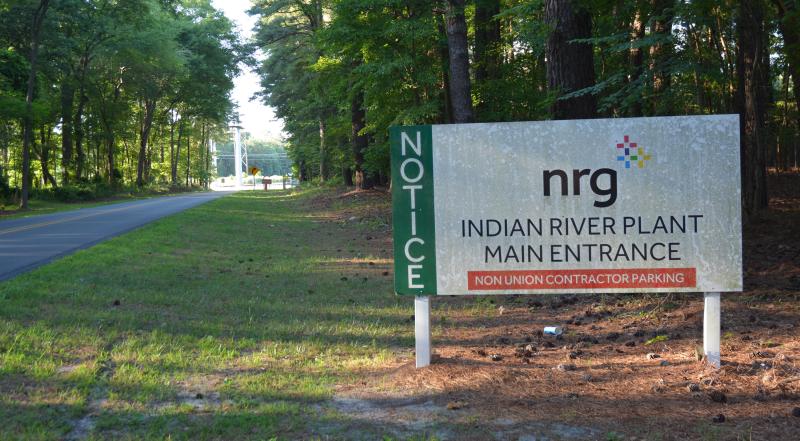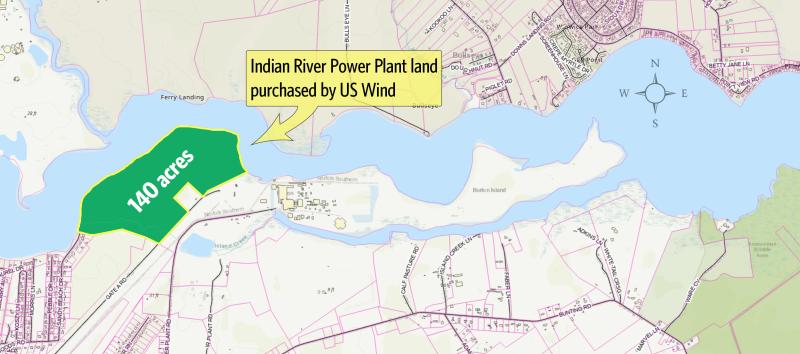US Wind appeals county’s denial of substation permit
As expected, US Wind has filed an appeal with Delaware Superior Court challenging Sussex County Council’s decision to deny a conditional-use permit for a new substation that would be used by the company's offshore wind farm.
County council did not discuss or even mention the Sussex County Planning & Zoning Commission’s unanimous recommendation in favor of the application, said attorney Richard Forsten, in his Dec. 26 submission to the court. Rather, he said, the council members who voted no each expressed animosity toward the offshore wind project – a matter not within their regulatory purview.
Under the name Renewable Redevelopment LLC, US Wind purchased 140 acres of land adjacent to the Indian River power plant in Dagsboro about one year ago. The company’s project, which recently received federal and state permit approvals, comprises up to 121 wind turbine generators, up to four offshore substations, up to four offshore export cables and one meteorological tower in ocean waters due east of Ocean City, Md. The offshore export cables are proposed to land at 3R’s Beach, north of Bethany Beach, and interconnect with the proposed substation, which would take up 23.5 acres of the total 140.
Citing a lack of benefits for the county and its residents, county council denied a conditional-use permit for the new substation during its meeting Dec. 17. The unfavorable vote came after the planning & zoning commission recommended approval of the conditional use in early July.
The sole basis for denial was the conclusion that the offshore wind project would not benefit Sussex County, said Forsten. These council members are wrong, he said.
There will be benefits to Delaware, argues Forsten. The project will provide about 1,750 MW of reliable, renewable-energy electricity to the entire grid, he said.
Delaware ratepayers, particularly those closest to the point of interconnection in Sussex County, would receive the benefit of lower locational marginal prices without bearing any of the cost to subsidize the capital build-out of the project, since that cost is being borne entirely by Maryland ratepayers, said Forsten.
“While Maryland receives the energy attributes, such as renewable energy credits, those benefits serve only to offset some of the substantial subsidy that Maryland ratepayers will provide,” said Forsten. “Accordingly, Delaware ratepayers, including the residents of Sussex County, receive much of the same upside of the new renewable-energy generation facility, but at a small fraction of the cost.”
Council’s attempt to stop an interstate power project that has been subject to exhaustive state and federal reviews, and has successfully secured permits from the relevant state and federal agencies constitutes error of law for failure to comply with Delaware law and the Sussex County code, said Forsten.
Nancy Sopko, US Wind vice president of external affairs, said the appeal was filed because the company strongly believes county council made the wrong decision.
“We know that the law is on our side and are confident that the county’s decision will not stand," said Sopko.
Chip Guy, Sussex County spokesperson, had no comment on the matter. As a matter of policy, the county does not comment on matters of pending or active litigation, he said.
Chris Flood has been working for the Cape Gazette since early 2014. He currently covers Rehoboth Beach and Henlopen Acres, but has also covered Dewey Beach and the state government. He covers environmental stories, business stories and random stories on subjects he finds interesting, and he also writes a column called Choppin’ Wood that runs every other week. Additionally, Flood moonlights as the company’s circulation manager, which primarily means fixing boxes that are jammed with coins during daylight hours, but sometimes means delivering papers in the middle of the night. He’s a graduate of the University of Maine and the Landing School of Boat Building & Design.


















































